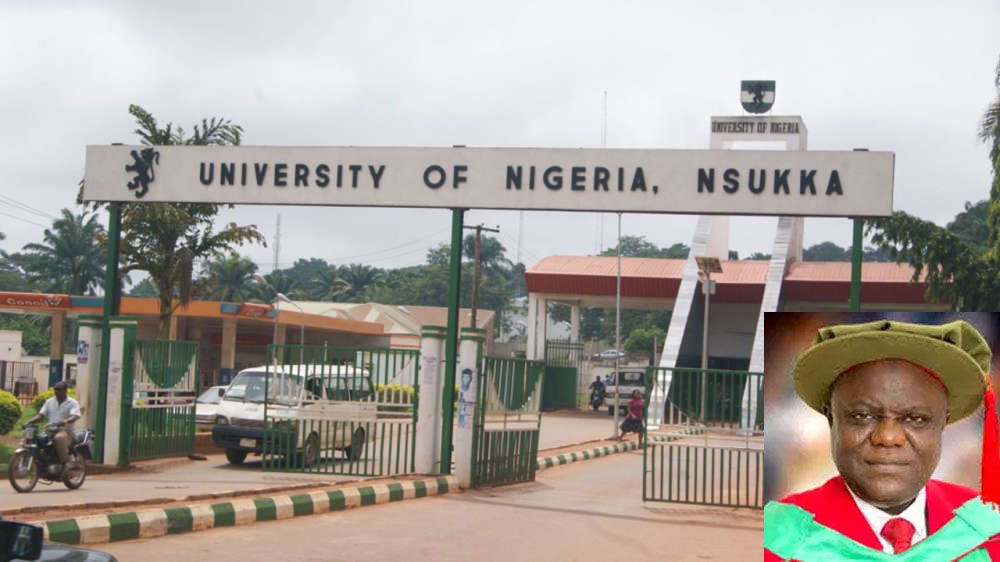“I will be firm, fair, and transparent in the discharge of my duties. UNN must not lag behind in the current technological revolution, characterised by the rivalry between OpenAI and DeepSeek,” he assured.

President of the Academic Staff Union of Universities (ASUU), Prof. Emmanuel Osodeke, say the union has extended the strike by 12 weeks.
The extension by another 12 weeks will make it 20 weeks students will stay at home since ASUU declared the current strike.
Osodeke told NAN in a telephone interview on Monday in Abuja, that it extended its roll-over strike for another 12 weeks to enable the Federal Government address issues in concrete terms.
He said that the extension was due to the Federal Government’s failure to implement the agreement entered with the union.
The union had embarked on a nationwide warning strike from February 14 to press home its members’ demands.
The first warning strike started on February 14 for four weeks and the second strike commenced on March 15 for another four weeks, while the third one is announced on May 9 for another 12 weeks.
The lecturers’ demands include funding of the revitalisation of public universities, earned academic allowances, University Transparency Accountability Solution (UTAS) and promotion arrears.
Others are the renegotiation of 2009 ASUU-FG agreement and the inconsistency in Integrated Personnel Payroll Information System.
The union during its last National Executive Council (NEC) meeting noted that it was disappointed that government had not treated the matters with utmost urgency they deserved and as expected of a reasonable, responsive, and well-meaning administration.
“NEC viewed government’s response so far as a continuation of the unconscionable, mindless and nonchalant attitude of the Nigerian ruling elite toward the proven path of the national development which is education.
Meanwhile, the Committee of Vice-Chancellors of Nigerian Universities has called on the Federal Government and ASUU leadership to resolve the lingering issues to end the ongoing strike.
The Chairman of the committee, Prof. Samuel Edoumiekumo, said this in an interview with the News Agency of Nigeria (NAN) on Sunday in Abuja.
He said it was crucial for both parties to come to an agreement to end the strike as soon as possible.
He urged them to honour agreements entered into for academic activities to commence in the affected universities.
“We have already given a press release arising from the meeting of the general assembly of the committee.
“We said that ASUU and the Federal Government should amicably resolve all lingering issues,” he said.
Edoumiekumo, who is the Vice-Chancellor of Niger Delta University, expressed optimism that the issues would be resolved soon.

Chicago University clarifies US visa revocation policy for international students
However, the University of Chicago has provided clarification to help ease these concerns for students on F-1 or J-1 visas.
Revocation means your visa is no longer valid and cannot be used to re-enter the U.S.

UNN appoints Prof Olayiwola Usman as first Yoruba DVC (Academics)
The University of Nigeria, Nsukka (UNN) has appointed Professor Kamoru Olayiwola Usman, a Yoruba Muslim from Oyo State, as Deputy Vice-Chancellor (Academics), marking the first time in the institution’s history that a person of Yoruba descent has held the position.
The appointment, made by the Acting Vice-Chancellor (Ag. VC), Professor Oguejiofo T. Ujam, is part of ongoing reforms aimed at fostering inclusive governance and restoring the university’s academic excellence.
In a statement issued yesterday in Abuja, the university reaffirmed its commitment to merit-based leadership and national unity.
Professor Ujam stated: “The appointment of Professor Usman reflects our resolve to prioritise competence over sectional considerations. It is imperative that we sustain this culture of inclusivity and meritocracy to move the university forward.”
In addition to Professor Usman’s appointment, the Acting VC also named Dr Mansur Adebowale Saddiq as Acting Director of the Medical Centre, further demonstrating his commitment to promoting excellence over sectional interests.
Both appointments have been widely welcomed by scholars and students from diverse backgrounds, recognising them as steps towards strengthening national unity within the institution.
READ ALSO:
Professor Usman, who succeeds Professor Urama, holds a PhD in Mathematics Education and previously served as Provost of the Federal College of Education (Special), Oyo State, from 2015 to 2023.
A distinguished academic, he is a fellow of the Mathematical Association of Nigeria and a member of several professional bodies, including the National Institute of Policy and Strategic Studies and the Nigerian Educational Research Association. His initial tenure as DVC (Academics) will last for two years, with the possibility of renewal.
Meanwhile, the statement also highlighted that during a recent University Senate meeting, Professor Ujam emphasised the collective responsibility of repositioning UNN as a centre for ethical and innovative learning.
“A collective effort is required to place the institution on a steady path towards ethical and innovative learning. UNN must regain its pride of place as Nigeria’s premier university. We must rid the system of narrow-minded sectionalism and divisive tendencies that have eroded the enabling environment for research, comparative studies, and the adaptive application of new knowledge,” the statement read.

FG to pay corps members backlog of delayed N77,000 allowance
The Federal Government has promised to pay the backlog of the new ₦77,000 monthly allowance to members of the National Youth Service Corps (NYSC).
The corps members’ allowance was increased from ₦33,000 to ₦77, 000 in September 2024.
However, the new rate has yet to be implemented.
Minister of Youth Development, Ayodele Olawande, on Monday said serving corps members and those in the scheme when the increment was announced in September 2024 would receive a backdated payment.
He gave the assurance when he was featured on Channels Television’s Politics Today.
He said, “You saw the new DG saying that you will get it, and they’re asking him a question ‘What about those that are going out now, are they going to receive it [backlog]?’ He said ‘We have your details’,” the minister said.
“The backlog, we will work on it and make sure it is paid. It may not be immediate but it will happen.”


BREAKING: Senator Natasha defies restrictions, arrives homecoming rally by helicopter [VIDEO]


How they murdered my Kano-bound passengers in Edo


Uromi: Edo residents flee towns over likely reprisal attack, arrest


In pictures: Eid celebrations around the world


Breaking: ‘Cancel your homecoming’ — Police tell Senator Natasha


‘I was offered N5bn bribe to impeach Fubara’


Kano Gov Yusuf, Sanusi linked to Eid killings


Nigerian boxer collapses, dies in ring during fight in Ghana